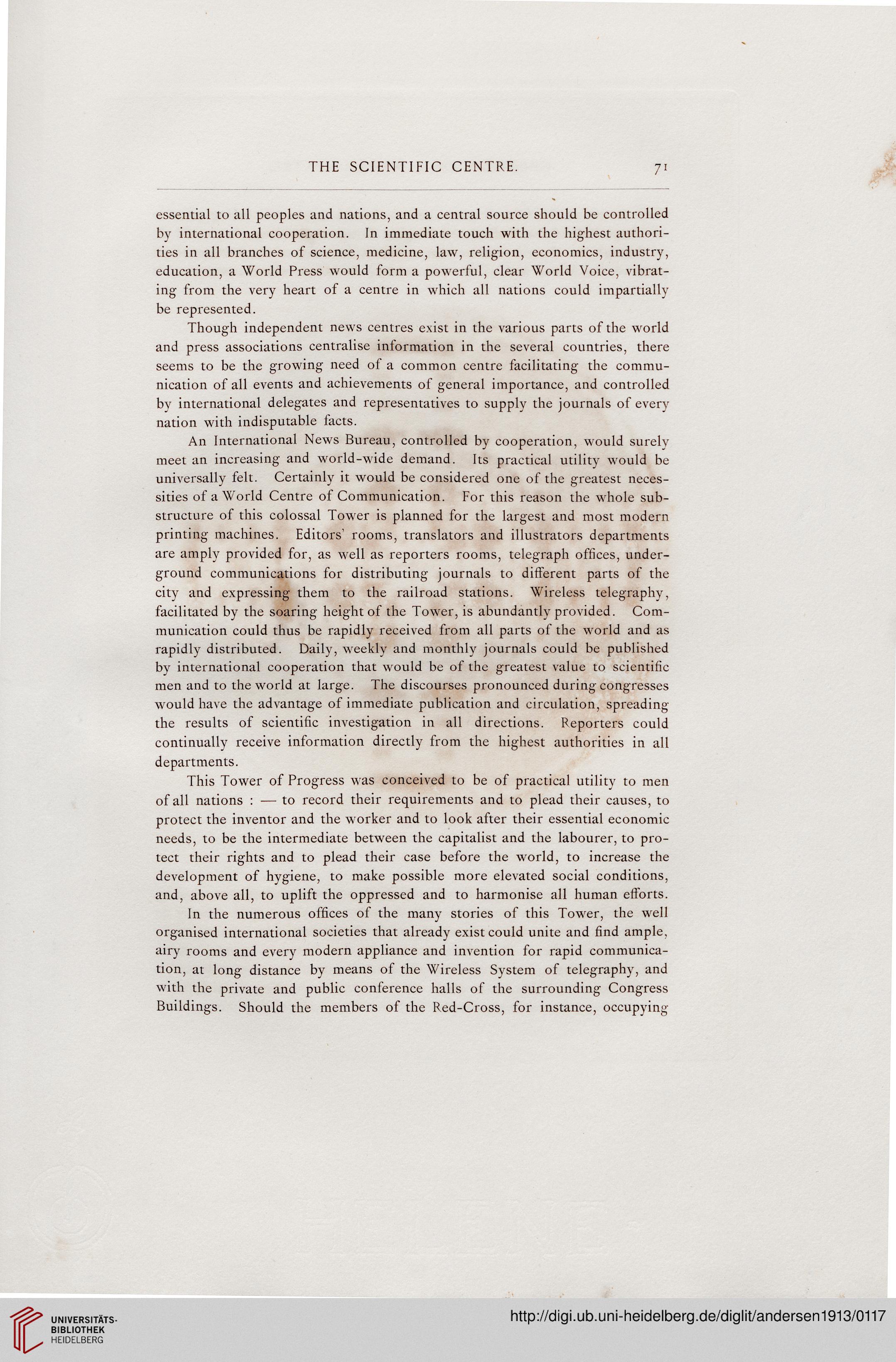THE SCIENTIFIC CENTRE. 71
essential to all peoples and nations, and a central source should be controlled
by international cooperation. In immediate touch with the highest authori-
ties in all branches of science, medicine, law, religion, economics, industry,
education, a World Press would form a powerful, clear World Voice, vibrat-
ing from the very heart of a centre in which all nations could impartially
be represented.
Though independent news centres exist in the various parts of the world
and press associations centralise information in the several countries, there
seems to be the growing need of a common centre facilitating the commu-
nication of all events and achievements of general importance, and controlled
by international delegates and representatives to supply the journals of every
nation with indisputable facts.
An International News Bureau, controlled by cooperation, would surelv
meet an increasing and world-wide demand. Its practical utility would be
universally felt. Certainly it would be considered one of the greatest neces-
sities of a World Centre of Communication. For this reason the whole sub-
structure of this colossal Tower is planned for the largest and most modern
printing machines. Editors' rooms, translators and illustrators departments
are amply provided for, as well as reporters rooms, telegraph offices, under-
ground communications for distributing journals to different parts of the
city and expressing them to the railroad stations. Wireless telegraphy,
facilitated by the soaring height of the Tower, is abundantly provided. Com-
munication could thus be rapidly received from all parts of the world and as
rapidly distributed. Daily, weekly and monthly journals could be published
by international cooperation that would be of the greatest value to scientific
men and to the world at large. The discourses pronounced during congresses
would have the advantage of immediate publication and circulation, spreading
the results of scientific investigation in all directions. Reporters could
continually receive information directly from the highest authorities in all
departments.
This Tower of Progress was conceived to be of practical utility to men
of all nations : -— to record their requirements and to plead their causes, to
protect the inventor and the worker and to look after their essential economic
needs, to be the intermediate between the capitalist and the labourer, to pro-
tect their rights and to plead their case before the world, to increase the
development of hygiene, to make possible more elevated social conditions,
and, above all, to uplift the oppressed and to harmonise all human efforts.
In the numerous offices of the many stories of this Tower, the well
organised international societies that already exist could unite and find ample,
airy rooms and every modern appliance and invention for rapid communica-
tion, at long distance by means of the Wireless System of telegraphy, and
with the private and public conference halls of the surrounding Congress
Buildings. Should the members of the Red-Cross, for instance, occupying
essential to all peoples and nations, and a central source should be controlled
by international cooperation. In immediate touch with the highest authori-
ties in all branches of science, medicine, law, religion, economics, industry,
education, a World Press would form a powerful, clear World Voice, vibrat-
ing from the very heart of a centre in which all nations could impartially
be represented.
Though independent news centres exist in the various parts of the world
and press associations centralise information in the several countries, there
seems to be the growing need of a common centre facilitating the commu-
nication of all events and achievements of general importance, and controlled
by international delegates and representatives to supply the journals of every
nation with indisputable facts.
An International News Bureau, controlled by cooperation, would surelv
meet an increasing and world-wide demand. Its practical utility would be
universally felt. Certainly it would be considered one of the greatest neces-
sities of a World Centre of Communication. For this reason the whole sub-
structure of this colossal Tower is planned for the largest and most modern
printing machines. Editors' rooms, translators and illustrators departments
are amply provided for, as well as reporters rooms, telegraph offices, under-
ground communications for distributing journals to different parts of the
city and expressing them to the railroad stations. Wireless telegraphy,
facilitated by the soaring height of the Tower, is abundantly provided. Com-
munication could thus be rapidly received from all parts of the world and as
rapidly distributed. Daily, weekly and monthly journals could be published
by international cooperation that would be of the greatest value to scientific
men and to the world at large. The discourses pronounced during congresses
would have the advantage of immediate publication and circulation, spreading
the results of scientific investigation in all directions. Reporters could
continually receive information directly from the highest authorities in all
departments.
This Tower of Progress was conceived to be of practical utility to men
of all nations : -— to record their requirements and to plead their causes, to
protect the inventor and the worker and to look after their essential economic
needs, to be the intermediate between the capitalist and the labourer, to pro-
tect their rights and to plead their case before the world, to increase the
development of hygiene, to make possible more elevated social conditions,
and, above all, to uplift the oppressed and to harmonise all human efforts.
In the numerous offices of the many stories of this Tower, the well
organised international societies that already exist could unite and find ample,
airy rooms and every modern appliance and invention for rapid communica-
tion, at long distance by means of the Wireless System of telegraphy, and
with the private and public conference halls of the surrounding Congress
Buildings. Should the members of the Red-Cross, for instance, occupying




